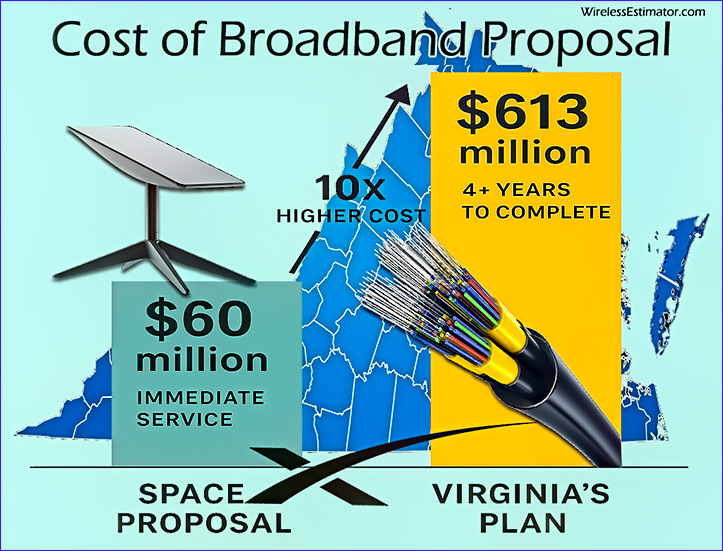
SpaceX has accused the Commonwealth of Virginia of wasting hundreds of millions in federal broadband funds and rigging its Broadband Equity, Access, and Deployment (BEAD) program in favor of high-cost fiber projects at the expense of faster, cheaper, and already available satellite service.
In an August 13, 2025 letter to the Virginia Department of Housing and Community Development (DHCD), SpaceX called the state’s BEAD Final Proposal “a massive waste of federal taxpayer money,” alleging it defies the Infrastructure Investment and Jobs Act (IIJA), the program’s Notice of Funding Opportunity (NOFO), and both state and federal procurement laws. The company is urging the National Telecommunications and Information Administration (NTIA) to reject the plan unless Virginia revises it to include true competitive neutrality.
Ten Times the Cost, Years Slower
According to SpaceX, Virginia ignored its offer to provide high-speed broadband to virtually every BEAD-eligible household in the state immediately for $60 million. Instead, the state’s Final Proposal recommends spending $613 million on fiber and other terrestrial projects that may take up to four years—or longer—to complete.
SpaceX argues that under the BEAD Restructuring Policy Notice issued in June 2025, Virginia was obligated to select the lowest-cost combination of proposals that met program requirements. “Virginia’s proposed results speak for themselves,” the company wrote, noting that the taxpayers are poised to “overspend for connectivity in Virginia by ten times the necessary amount.”
Alleged Competitive Failures
The company claims Virginia failed to run a truly competitive process:
Pre-ordained outcome: SpaceX alleges the state started with a predetermined preference for certain fiber providers and reverse-engineered its “analysis” to justify excluding satellite bids.
Unequal treatment: More than 95% of BEAD households were ruled ineligible for Starlink service based on what SpaceX calls “biased third-party analysis” promoted by its competitors.
Re-bidding violations: The state allegedly re-competed more than 18,000 locations that SpaceX had already applied for, contrary to NOFO rules.
Opaque evaluation: SpaceX says Virginia never disclosed the criteria used to downgrade its proposals and never engaged in technical discussions to address alleged deficiencies.
In an August update, Virginia announced that 133,472 locations will gain broadband within four years through $613M in infrastructure subgrants, $200M in federal savings, and a mix of fiber, cable, fixed wireless, and low-Earth orbit satellite service.
Evidence from the Ground
SpaceX cited its own subscriber data to challenge Virginia’s assumptions:
95% of BEAD-eligible locations have an active Starlink customer within one mile.
15% have an active subscriber within 100 meters—undercutting Virginia’s claim that Starlink cannot serve those households.
The company says Virginia’s plan would spend $91 million to build new infrastructure for households already using Starlink—a sum that alone exceeds SpaceX’s total bid to serve the entire BEAD area.
Point Broadband Example
The letter also singled out a match-funding waiver for 2,236 locations awarded to Point Broadband Fiber Holding, LLC. Virginia claimed no provider could meet the required 25% cost share for those sites, but SpaceX says it offered to serve them for $1.7 million with a 73.9% match. Instead, the state plans to pay Point Broadband an average of $6,217 per location—nearly 10 times higher.
Technology Neutrality at Stake
SpaceX argues that Virginia’s Final Proposal violates NTIA’s mandate for a technology-neutral BEAD program, which explicitly rejects “imposition of technology preferences” and calls for open competition among all broadband technologies that meet performance standards.
“Put simply, Virginia’s claims about Starlink’s efficacy throughout its territory… are absurd,” the letter states, calling the state’s reliance on unverified studies “sham” evaluations that mirror long-standing lobbying tactics by the fiber industry.
What SpaceX Wants
The company is asking NTIA to require Virginia to:
Re-evaluate all BEAD applications under a fair, transparent, technology-neutral process.
Revise the Final Proposal to reflect cost-effective awards.
Deny the plan outright if the state refuses to comply.
According to SpaceX, this would not delay broadband availability—in fact, it would accelerate it—by awarding funds to providers like Starlink that can begin service “tomorrow” rather than years from now.
Implications for the BEAD Program
The dispute highlights a broader national debate over BEAD implementation. The Biden administration’s original program guidance was restructured in 2025 by the Trump administration to emphasize lower costs and faster deployment. SpaceX contends that Virginia’s plan reverts to the earlier, fiber-preferential model—potentially setting a precedent for other states.
If NTIA sides with SpaceX, Virginia could be forced back to the drawing board, delaying project awards but potentially redirecting hundreds of millions in funding toward lower-cost, immediately available broadband options.
















